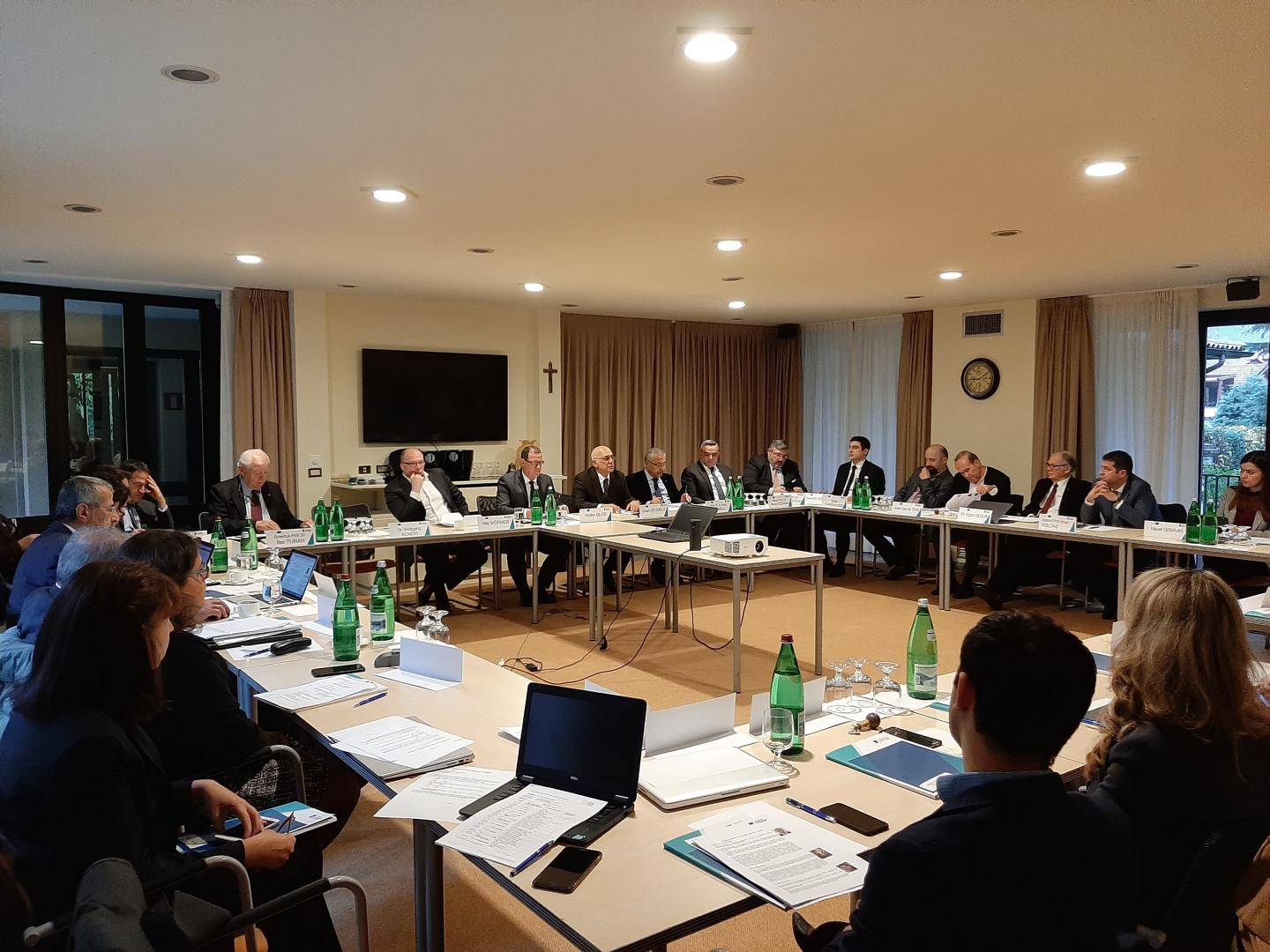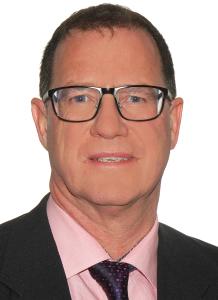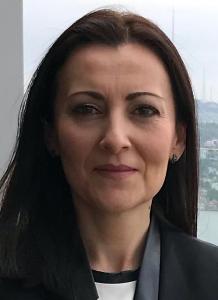ISC-Workshop on “EAST MED and a WORLD in Turmoil” 17- 20 November 2019, Cadenabbia, Italy - Foundation Office Turkey
Workshop
Details
Six panels focused on diverse security and policy challenges of the region, with special consideration of different topics such as the post-conflict era in Syria, regional and global US sanctions, proxy wars, the rise of Russia in the Middle East and East Med, mass refugee movements in East Med and North Africa, and the increasing energy and political polarization in the East Med and Middle East.
Walter GLOS from KAS Turkey and Ercan ÇITLIOĞLU from Başkent University, Center for Strategic Studies, opened the workshop, underlining its importance in times where the world is in turmoil. Multilateralism and democracies are fading and populism is spreading all over the world. The opening speeches were held by the Vice President of Başkent University, Prof Dr A. Kadir VAROĞLU and the Vice President of the Near East University Assoc. Prof Dr Murat TÜZÜNKAN. Prof Dr A. VAROĞLU stressed that this workshop was an opportunity to find commonalities and understand each other as well as each of the global players because geopolitical symmetry has changed to asymmetry. Assoc. Prof Dr TÜZÜNKAN focused on the recent finding of gas in the Eastern Mediterranean, which will soon become even more important for energy provision in the region. As the gas discoveries can increase tensions in the region, they should be managed properly so that no new conflicts arise.
The first panel was entitled: “Post-conflict Syria and the New Middle East security architecture, shaping of the New Middle East” and was moderated by Dr Micha’el TANCHUM of the Truman Research Institute for the Advancement of Peace, The Hebrew University of Jerusalem. Emiterus Prof Dr Ilter TURAN was one of the panellists who was of the opinion that the end of the Syria conflict is still far away and all international players agree that IS needs to be kept weak. The territorial integrity of Syria needs to be maintained and a formula with international support will have to be found. This solution will have to include the return of refugees and a reconstruction plan. David BATASHVILI from the Georgian Foundation for Strategic and International Studies (GFSIS) stressed that the area changes quickly and the structural long term changes in the region have effects on regional conflicts. Dr Carsten WIELAND, Senior Expert for Intra Syrian Talks at the UN Office of the Special Envoy for Syria and Fellow at GCSP (Geneva Centre for Security Studies) added that the constitutional discussions that recently began, will talk a lot about decentralization. The main original conflict of the Syrian Civil War is over and now the following conflicts need to be solved for a Syrian future. Most of these conflicts are being handled bilaterally, creating a web of different bilateral interests, whereas the UN process is multilateral.
The second panel addressed: „What could be the implications of US sanctions against Iran? Both globally and regionally” and was moderated by Prof Dr Yelda ONGUN, Director of the Center for Strategic Studies, Chair of Political Science and International Relations, Başkent University Ankara. Prof Dr Sami NADER of the International Relations Dept. at USJ University in Beirut outlined that sanctions are an asymmetric tool which countries cannot respond to. However, some of them are using proxy warfare as another asymmetric tool, trying to destabilize the region and find an answer to the sanctions. One has to see the conflicts together and cannot separate the military arm from its political arm. A bridge country as a nation of bringing people together is needed. The EU should deal with it. Emeritus Prof Dr Ilter TURAN told that sanctions are a means of imposing change on a government or its policies and are only effective when they are implemented, for which they need consensus and also the necessary means. Additionally, the counter-measures of the sanction victim need to be considered. Embargos are not a symmetric instrument and they might not be the most reliable way to penalize a state, nor might and the outcome be the one that was wanted. Former Amb. Selim KARAOSMANOĞLU, said that one has to visualize that Iran is bigger than Germany, Turkey and France together. There is never a water-tight embargo and it mainly hurts civil society and might also give governments an excuse for failed domestic policies.
The third panel was held under the title: “Identity mobilization Proxy Wars and Alignments: The Saudi-Iran rivalry and the future of war and peace in the Middle East” was moderated by Assist. Prof Dr Elena ALEKSEENKOVA, Head of the Center for Italian Studies at the Institute of Europe RAS. Former Amb. Selim KARAOSMANOĞLU said that out of 50 big conflicts worldwide, the ones in the Middle East are the most complex ones, for they are located in a very important strategic region. Dr Micha’el TANCHUM of the Truman Research Institute for the Advancement of Peace, The Hebrew University of Jerusalem outlined that the Eastern Mediterranean was becoming the center of the world with a big focus on new alignments that were just emerging now, especially after the Syrian war. The Syrian civil war changed the architecture of the Middle East, shaping new configurations and bringing new actors who are -in fact- the old actors doing new things.
The last panel on day-1 was on: “The Rise of Russia in the Middle East and Eastern Med - Overview of Russian interests and the Eurasian perspective”. Dr Canan ATILGAN, Head of the Regional Program Political Dialogue South Mediterranean, KAS Tunis moderated the first panel. Ruslan MAMEDOV from Russian International Affairs Council stated that the main future issue for Russia was how to shift from a military to a political to an economic approach, with the key of Russia’s foreign policy being its energy policy in the Middle East and that Russia was starting its gas project in the Eastern Mediterranean. Prof Dr Sait AKŞİT explained that Russia presents itself as a balancer, providing stability in the region. The developments in the Middle East gave Russia the chance to challenge the West. This also gave Russia the opportunity to reform itself in a time when geopolitics became more important in the region. Prof Dr Elena ALEKSEENKOVA concluded that during the last years Russia became a bigger player in the region. What is surprising is that Moscow managed to keep good relations with all sides and cooperates with regional actors, e.g. Turkey. It is ready for tangible and fast decision making, in contrast to Europe or the US, who have long decision-making processes.
Dr Wolfgang ECKERT, Senior Vice President of Critical Infrastructure of EnBW (Energie Baden-Württemberg AG) held a keynote speech on “Stability is not everything, but without stability, everything is nothing. How economic cooperation could unwind political tensions in the Middle East”.
The second day of the workshop started with the following topics: “Managing migration together: Coping with mass refugee movements from the East Med and North Africa. What can the common preventive strategies be? The EU’s approach to Human Security in the EastMed; problems and prospects”. Assoc. Prof Dr Umut KOLDAŞ, Representative of the TRNC to Bahrain was the moderator of this panel. Assoc. Prof Dr Nur KÖPRÜLÜ, Vice-Dean, Faculty of Economics&Administrative Sciences and Head of the Department of Political Science, Near East University (NEU) stressed that the 2011 Arab uprisings which have engulfed most of the Arab countries in the Middle East and North Africa had produced dramatic results for the Syrian people. Eight years into the turmoil in Syria, the huge influx and movement of refugees in the Mediterranean region represents the world’s largest displacement and humanitarian crisis today since the end of WWII. Given the changes in the landscape of international politics, no state can really cope with the new realities alone. Former Amb. Namık TAN delivered a speech on migration which focused in particular on three aspects. First, Tan tackled the terminology used for defining and conceptualising migration. He then provided an overview of the refugee crisis’ impact on Turkey and how the country has managed the crisis thus far. Finally, Tan addressed the implications of the refugee crisis for Europe, also highlighting potential prospects and strategies for the EU. Dr Carsten WIELAND concluded that the migrant/refugee crisis presented a wide array of challenges both short and long term. At the same time, there are different types of migration. Refugee communities are very active on social media and they engage with political factors in the host countries. This makes migration not only a national problem, but can also cause other threats.
The last panel of the workshop was on: “What could be the Implications of increasing energy and political polarization in the East Med and Middle East, could actual challenges and disputes be turned into opportunities?”, moderated by Nodar KHARSHILADZE, Founder of Georgia Strategic Analysis Center and Former Deputy Minister of Internal Affairs of Georgia. Ergün OLGUN, Former Presidential Undersecretary, TRNC and Former Chief Negotiator for UN Talks was the first panellist. He commented that the need to address this topic from a country/case specific perspective regarding the definition of the challenge, the dynamics for change/transformation and the window of opportunity. It is important to resolve the Cyprus issue and the unilateral hydrocarbon initiatives to uncomplicate the problem, which otherwise might result in instability and polarization in the East Med. He therefore believes that the current challenge regarding energy exploitation could in time turn into an opportunity. Cooperation on energy in the East Med is a must. Harry TZIMITRAS, Nonresident Senior Fellow Eurasia Center and Global Energy Center, Atlantic Council and Director of PRIO Cyprus Centre (the Peace Research Institute Oslo) pointed out that there is a need for realism because most of the discussions on this topic were unpragmatic. Urgency is very important in this process because it changes very rapidly. EastMed will be the next Energy Hub absolutely floated by gas. Charles ELLINAS, Nonresident Senior Fellow at Atlantic Council's Global Energy Center gave a presentation on EastMed gas discoveries and their importance for the geopolitical dynamics of the region. The purpose of EastMed gas should be promoting regional cooperation.
In the closing remarks, the representatives of KAS Turkey and the Center for Strategic Studies, Başkent University Ankara expressed their commitment to the continuation of this workshop and thanked the participants for their very insightful contributions.







